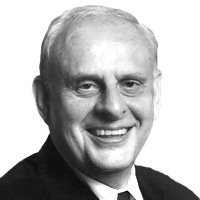
If President Obama has the skill and will to drive home the main point of his Oval Office speech, he could become a great president. Simply put, this is the message: The United States needs to wind down its military involvement in Iraq and Afghanistan as quickly as possible in order to focus on rebuilding America and especially its economy. In his words, “Our nation’s strength and influence abroad must be firmly anchored in our prosperity at home.” And later in the address, he added: “Our most urgent task is to restore our economy, and put the millions of Americans who have lost their jobs back to work.”
The problem is that his other words and logic on Tuesday, plus circumstances in the region, will tug him in almost the opposite direction. Thus, though he pledged to withdraw the remaining 50,000 U.S. troops from Iraq by December, 2011, his reasoning suggested a much longer haul there—should the Iraqis desire it and should their performance merit it. Regarding Afghanistan, he seemed to say that he would remove the 30,000 “surge” troops he recently dispatched there in the relatively near future, much as President Bush rapidly withdrew his 20,000 “surge” troops from Iraq when their job was done. But the very ambitious goal Obama restated Tuesday night promises a very long stay: “We will disrupt, dismantle, and defeat Al Qaeda, while preventing Afghanistan from again serving as a base for terrorists.”
Iraq now has actually become strategically important to the United States. It was not so when President Bush ordered the invasion of Iraq and the toppling of Saddam Hussein.
• More Daily Beast Writers React to Obama's Iraq SpeechAs for Iraq, it will be very difficult for Mr. Obama to withdraw all the remaining 50,000 troops by the end of 2011. He restated Tuesday that America’s advisory, training, and logistical role would continue. He didn’t mention that U.S. troops would also be needed to protect U.S. diplomats who will soon flood to the country. But there is a more compelling reason for keeping troops in that country: Iraq now has actually become strategically important to the United States. It was not so when President Bush ordered the invasion of Iraq and the toppling of Saddam Hussein. At that point, and despite public claims by the White House, Iraq was not near a nuclear weapons capability, was no longer much of a threat to its neighbors, and was certainly not a haven for Al Qaeda—that came only after the U.S. attack. But when Bush smashed Saddam Hussein’s Iraq, he destroyed the only possible regional counterweight to Iran. In one stroke, Bush turned Tehran into a regional superpower that could be checked only by an outside superpower, the United States. Thus, it is now of strategic importance to restore the viability of Iraq as a balancer in the Gulf region, at least to some degree. That will take time and some American military presence.
The size and character of this presence, of course, depends on the desire of the Iraqi government, such as it may be. More and more, Iraqis say they want Americans to stay. But for Iraq’s and America’s sake, the American military presence should be relatively small, say about 10,000 to 15,000 troops, to carry out agreed-upon missions.
But while Iraq’s new strategic importance is clear, Afghanistan’s importance is not—nor is Mr. Obama’s thinking on the subject. His goal of defeating Al Qaeda and preventing its return to Afghanistan is farfetched. He seems to have so much faith in General David Petraeus, his new commander, and might believe the general can perform miracles. But Petraeus cannot find a partner for his Afghan surge in anyway comparable to the Sunni Arabs of Iraq. Those Sunnis looked to American troops in Iraq as a lifeline to protect their own community. Without Sunni support, the famous surge in Iraq never could have worked.
Another of Mr. Obama’s points on Tuesday did not add up. He said that Al Qaeda was “anchored” in Northwest Pakistan, but the fact is these terrorists are now all over the world. Even if defeated in Afghanistan, they will find anchorage in Pakistan, Yemen, Somalia, London, and New Jersey. And whatever the outcome in Afghanistan, a small and insignificant country, it will have little bearing on the fate of an enormous country that really does matter—Pakistan. Whether this secular Pakistan falls to Islamist extremists depends neither on Afghanistan nor on the United States, but on the Pakistanis themselves, and the will and ability of Pakistani leadership to transform itself into a good government, and rid the country of its greedy and destructive feudalism.
Tuesday night, Mr. Obama eloquently captured what needs to be done: “In an age without surrender ceremonies, we must earn victory through the success of our partners and the strength of our own nation.” So, he really wants to do what is both right and essential: First and foremost, rejuvenate the country and the economy. If this is not done, the president reminds everyone, the United States will lose its influence in the world dramatically over the next decade. The trouble is, it’s very hard to fix the country and the economy in the political killing fields of today’s Washington. It’s doubly difficult when Mr. Obama himself jumps from issue to issue, thereby draining his focus and power. And President Obama's great cause of American restoration will be further weakened if he fails to scale down U.S. efforts in Iraq and Afghanistan to modest and manageable levels soon.
Leslie H. Gelb, a former New York Times columnist and senior government official, is author of Power Rules: How Common Sense Can Rescue American Foreign Policy (HarperCollins 2009), a book that shows how to think about and use power in the 21st century. He is president emeritus of the Council on Foreign Relations.






